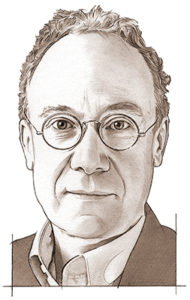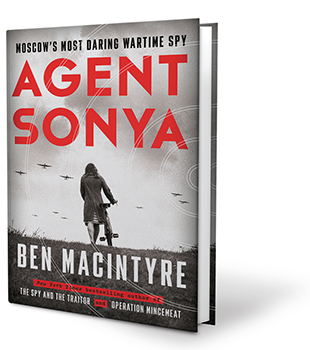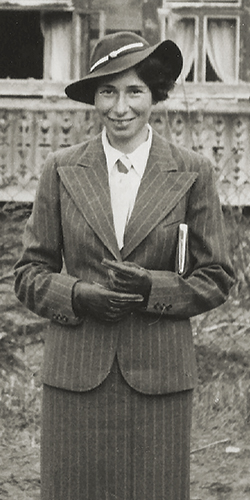
By the end of World War II Ursula Burton was living an unassuming life in England’s rural Cotswolds—or so everyone thought. The married mother of three was actually Ursula Kuczynski, a colonel in the Soviet military and one of the most significant spies of World War II and the Cold War. Born a German Jew, she went by the code name Sonya and ran one of the 20th century’s most effective espionage rings. Her agents nearly assassinated Adolf Hitler and later stole secrets from the U.S. and Britain to enable Russia to detonate an atomic bomb in 1949. Agent Sonya: Moscow’s Most Daring Wartime Spy details the exploits of this professional spymaster. A writer at large for The Times in London, Macintyre is the author of Operation Mincemeat and The Spy and the Traitor.
 Ursula Kuczynski’s exploits remain largely unknown. Why?
Ursula Kuczynski’s exploits remain largely unknown. Why?
One of the reasons we don’t know about her is because she was a woman. I think that played a huge part. Historians have tended to assume that if she was overlooked by her colleagues, then she should be overlooked by history. Actually, she really made a huge difference. One of the reasons why she’s an obscure figure to history is because she spent the last part of her life in East Germany and was used for propaganda purposes by the communists. But the atomic stuff is extraordinary. She rose through the ranks of military intelligence, which is rare to the point of being unique. I don’t know of another woman who rose so high in the military intelligence service anywhere in the world.
What did she do?
Ursula was important before World War II. She was working with communist underground networks, defying the Nazis, fighting the Nationalists in China, fighting the Japanese occupiers in Manchuria. She was even more important during the war. She was running the most important spy network inside Germany. She came closer to assassinating Hitler than many of the failed attempts. Information of top quality was coming through her to Moscow and helped change the course of the war.
Ursula was absolutely pivotal after the end of World War II. When the Cold War subsequently developed, she became one of the most important operatives in the entire Western world. She was running the top atomic spy, Karl [Klaus] Fuchs, and it doesn’t get much higher than that.
‘Ursula didn’t reveal herself as a spy until her children were in middle age, so it came as an enormous shock to them’
Why was she so successful?
Ursula understood she could be effective by exploiting her gender. She knew that the more children she had, the better her cover. She knew that being a wife and mother would work brilliantly. In fact, you see this when you look at her MI5 file. They got closer to catching her than anyone. But when Ursula shows up at the door wearing an apron while baking a birthday cake for her son, they effectively said, “It can’t be her, she’s a mother.” That’s how ingrained those views were. The GRU (the Russian military intelligence service) realized very early on the same reality—that as a woman she was virtually invisible—and they exploited that brilliantly.
Also, many spies in World War II were amateurs. They were recruited because they had a facility for languages or some other skill. Often they were extremely poorly trained. These agents perished disproportionately, because they were not adequate to the task. Ursula was different, because she was a professional. She was a career military intelligence officer. At the age of 21 she had decided that would be her vocation. I think that makes her completely different than any other female spy I have come across.
Why did you write this book?
I came to the story largely by accident. I was actually investigating another story, which was about the American use of anti-Nazi agents at the end of the war. I was always very interested in Operation Hammer, when the OSS parachuted spies into Europe. When I started digging, I discovered this shadowy figure of a female spy who was recruiting communists to infiltrate this effort. It was only later that I worked out this was Agent Sonya, who also ran Fuchs when he worked at the British nuclear weapons program. Before that Fuchs stole atomic secrets from Los Alamos for the Soviets.
How did Ursula become a spy?
The story really began back in Weimar Germany when Ursula and many other left-leaning Germans believed the only way to stop the appalling scourge of Nazism was to back the communists. That was a perfectly respectable position to take at that time. History eventually pivoted around Ursula, and she began to spy against the West. But to begin with, she was absolutely allied with the West in trying to stop Hitler.
Before World War II she went to Shanghai and worked with the communist underground. She was recruited by American novelist Agnes Smedley and Richard Sorge, who Ian Fleming said was the most formidable spy in history. Ursula was later trained in Moscow, went to Poland and then Switzerland, where she ran a vast spy network operating inside Nazi Germany and plotted the assassination of Hitler. Her final and most important role was as a spy in rural Britain, where she ran agents inside Britain’s atomic weapons program. That’s the moment when she really started to affect the course of history.
How tough was she?
Her courage was astonishing. Her capacity to absorb the shocks of the 20th century is amazing. She was tough as only somebody who lived through those appalling events could be. Her family was forced into exile, her friends had been destroyed, the things she believed in had been systematically attacked and disabused.
Those are her attractive traits. Where Ursula is more difficult for us to understand is the way she treated her children. She was a good mother and adored her children. But there is little question to me, and little doubt they had, that at the end the revolution came first. If it had come to a battle, she would have been prepared to sacrifice her family. Let’s bear in mind that she put her family at high risk. We find it repellant that any parent could put a cause above human relations. On the other hand, it’s worth remembering that some of the heroes we celebrate the most acted similarly. Think of the French Resistance fighters who stood up to Nazism. They also put their families at risk. They were prepared to die in a cause and see their families die in a cause. I do think there is a double standard. She often asked the question of herself: “Was I a bad mother but a good spy?” That is not necessarily a question we would ask of a man.

What kind of person was Ursula, really?
For an indoctrinated communist, Ursula was amazingly open-minded. She was prepared to listen to opposing views. Her beliefs evolved over time. By the end of her life she had a much more subtle attitude toward things. She was still a communist—there’s no doubt about that—but she was absolutely prepared to admit that terrible mistakes had been made and that the people who had applied communism had gotten it appallingly wrong. As the Berlin Wall came down, I think she was deeply disillusioned. There were moments later in life that she saw the effects of communism and saw it for what it really was.
Ursula was not a one-dimensional, female James Bond character. She wasn’t a simple fictional heroine—she was a real person, a human being who was fallible and complicated. She believed things we don’t believe. I always try in my books to explore what ordinary people do in extraordinary circumstances. How do they respond to an appalling tidal wave of history? Ursula was very different from many of the people I’ve written about before and in some ways far more demanding as a subject.
What happened to her?
Ursula managed to retire from espionage—which is rarely an easy thing to do. She walked away with almost no retribution and lived to the ripe old age of 93. The only other person that I can think of who did that was Kim Philby, but he lived a life of utter misery.
One of the most extraordinary things about Ursula was her ability to survive inside the Soviet system. She never fell foul of the purges, especially at a time when Jews and spies were particularly suspected and died in the hundreds at Stalin’s hands. Yet she—a spy, a foreigner, a woman and a Jew—survived. She knew her spycraft, and she employed it brilliantly. She never broke the rules. We don’t like to hear it, but the Soviets were very, very good at this stuff. They were brutal, they were horrendous, they served an appalling regime, but in the art of espionage— to coin a phrase—nobody did it better.
How did her children react to her being a spy?
Ursula didn’t reveal herself as a spy until her children were in middle age, so it came as an enormous shock to them. Michael, the oldest child, never really completely recovered from the fact that his mother was someone else. He loved and admired her but was devastated by her secret. He was very poignant about it. I spoke to him before he died early this year in his 90s. One of the things he said that really moved me was, “Reading your book, I feel like I know my mother better now than I ever did before.” He also told me, “I don’t think I ever really learned to trust anybody.”
People get damaged in this type of story. Secrets are toxic in the end. People suffer. There is a human cost to all of this. One of the costs for Ursula was her children.
How should we remember Agent Sonya?
I don’t want readers to love Ursula, though some actually may end up doing so. I don’t even want them to like her, although many certainly will. I would be much more content if they understand her and get a sense of the world she came out of.
We tend to look back on history as if it was some kind of moral lesson. There are good people, and there are bad people. The villains always lose, and the heroes always win. Of course, life isn’t like that, and neither is history. History is composed of fascinating shades of gray. We don’t need to pass moral judgment on it. We just need to try to get to grips with it, and then we start to learn from it. MH





